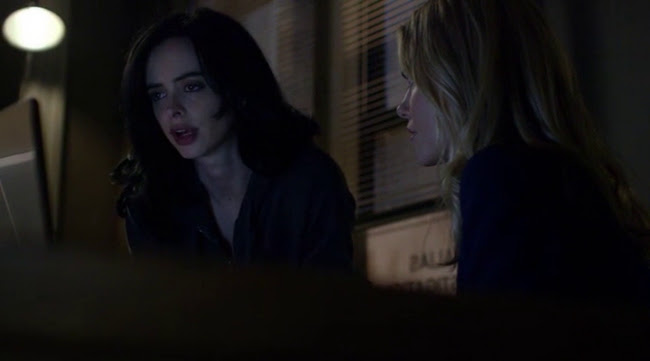
I wanted to talk about how much I hated the episode of Jessica Jones I watched last night, the fifth episode, but I realised it wouldn't be fair considering I didn't talk about how much I liked the ones that preceded it. A lot of people say it's more fun to write negative reviews--Peter O'Toole says it in Ratatouille where he plays critic. I've always kind of hated that speech of his (I wrote a parody of it in one of my comics) because it seemed so obviously like it came from a screenwriter with an axe to grind with very little actual insight or empathy into the critical process. Few critics the age of O'Toole's character in the film actually like writing bad reviews, I would argue. Someone who still has that glee at slamming a work of art that outweighs their joy at praising a work of art is either immature or a sadist (or both). In one sense one should enjoy writing a bad review, for the same reason an immature person generally does--it's the pleasure of knocking someone down a peg, which some people really need, particularly people who deny real artists opportunity and waste money making safe tripe regurgitated for the ten thousandth time. An immature critic will get that pleasure writing a bad review for anything because he or she still has the feeling of having a lot to prove and, like a lot of teenagers, they try to define themselves by being contrary.

So, okay, I'm five episodes into Jessica Jones now--no, still no binge watching for me. I probably wouldn't even if I had that kind of time. I'd gotten so used to being able to rely on the show, episodes one through four are quite good. I like Jessica's relationship with Luke Cage, who's indestructible while she has the super strength. I love how effectively threatening David Tennant's Kilgrave is in those episodes, how he has the psychological effect of an abuser of women without being a metaphor for a particular, real life kind of abuser. I love how the show has been about women helping each other, about fighting the urge to protect oneself at the cost of letting someone else suffer. Krysten Ritter is sharp and funny, powerfully asserts herself while still making you believe in her vulnerabilities.
It's largely because of all this stuff I liked that I hated the fifth episode. Written by Dana Baratta, I wasn't sure if she was a man or a woman until I googled her, but I did think as I was watching that this kind of masculine shit could only come from a woman. That is, a woman trying to guess how she's supposed to write for men. I read an interview with David E. Kelley once where he was asked how he was able to write women so well and he replied that he simply writes them the same way he writes men. I think there's a little more to it than that but I do think a lot of the problems one gender has with writing another is in assuming how very different the opposite gender is to oneself. The consequence is that characters of the opposite gender tend not to come off like people.

Neither men or women are written well in Dana Baratta's episode of Jessica Jones, actually. There's a self-loathing quality in how consistently stupid the women are written and how flawless the men are. The previous episode had ended really well with the cop, Will (Wil Traval), torturing himself because Kilgrave had mind controlled him into trying to murder Trish (Rachael Taylor). Trish already had trust issues, taking self defence classes and having reinforced steel doors on her apartment, so when he'd gotten past her door to strangle her it obviously really traumatised her, which we can see in her behaviour afterwards. Him heartbreakingly trying to convince her and himself he's not that guy, she trying to reason with herself to trust people, the two of them talking through her security camera--it was a wonderful portrait of people trying to figure out how to get beyond being violated.
And then, Dana Baratta decides they should hook up.

You fucking asshole.
Even the bruises on Trish's neck are gone, along with all the interesting psychological subtext. Suddenly they're the cute new couple sheepishly trying to explain to Jessica why she finds Will in Trish's apartment in his underwear, why Trish hasn't been returning her important calls about trying to stop the psychopath who'd invaded both their lives.

And then suddenly Will, the average cop who'd been pulled into this by Kilgrave, has all this Special Ops training and just happens to know where there's a warehouse with a hermetically sealed cell perfect for holding Kilgrave. And Jessica doesn't want his help or to listen to him because . . . because . . . NO FUCKING REASON except women are idiotically emotional in Baratta's teleplay and all the men have their shit together.

Then they really easily capture Kilgrave who'd been just about untouchable in the previous episodes--no surprise since he can mind control anyone with just a word. Then he really easily gets away when Jessica, with the super strength, is really easily taken down by three guys with tasers.
No. I don't enjoy this. I'm writing this because I'm pissed off a show I could rely on to end my busy day and relax with took a massive shit on my television. It's worse because so much of this shit is exactly the sort the show had seemed to be rebelling against so delightfully.
Well. Looks like Baratta is co-writer on only one upcoming episode, hopefully I won't have to put up with her too much.